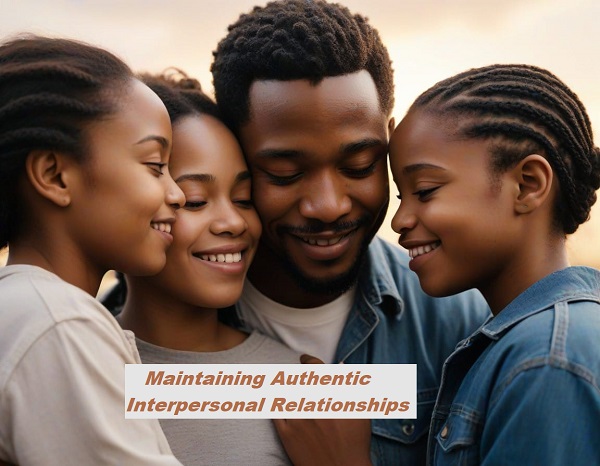Maintaining Interpersonal Relationships
Building and maintaining interpersonal relationships is essential for a fulfilling life. These connections provide emotional support, improve mental health, and contribute to personal and professional success. In this article, we’ll explore actionable strategies to enhance your relationship skills, ensuring your connections are both meaningful and enduring. Within this blog article we will look at the following key takeaways in more detail;
Key Takeaways Relating To Maintaining Interpersonal Relationships
- Strong relationships improve both physical and mental health.
- Effective communication is key to maintaining relationships.
- Trust and respect are foundational elements of any relationship.
- Spending quality time strengthens bonds.
- Conflict resolution skills are essential for long-term relationships.
Importance of Maintaining Interpersonal Relationships
Interpersonal relationships are the cornerstone of a happy and healthy life. They play a significant role in our emotional and physical well-being, offering support during challenging times and enhancing our joy during good times. Let’s delve into why maintaining these relationships is so crucial.
Emotional and Physical Health Benefits
Strong relationships have a profound impact on our health. Emotionally, they provide a sense of belonging and reduce feelings of loneliness. This connection can lower stress levels and improve mental health. Physically, studies have shown that people with strong social ties have lower rates of anxiety and depression, a stronger immune system, and even a longer life expectancy.
Consider the story of John, a 45-year-old who struggled with stress and high blood pressure. After reconnecting with old friends and building a support network, John noticed a significant improvement in his health. His blood pressure normalized, and he felt more relaxed and content.
Role in Personal and Professional Success
Interpersonal relationships are not just beneficial for health; they also play a vital role in personal and professional success. A strong network can provide opportunities for career advancement, mentorship, and collaboration. In personal life, these relationships offer companionship, love, and shared experiences that enrich our lives.
Impact on Happiness and Longevity
Research consistently shows that people with strong social connections are happier and live longer. The famous Harvard Study of Adult Development found that close relationships, more than money or fame, are what keep people happy throughout their lives. These ties protect people from life’s discontents, help to delay mental and physical decline, and are better predictors of long and happy lives than social class, IQ, or even genes.
Challenges in Maintaining Interpersonal Relationships
While the benefits of strong relationships are clear, maintaining them is not always easy. Various challenges can arise, from communication barriers to cultural differences and time constraints. Understanding these challenges is the first step to overcoming them. For more insights, explore how to maintain interpersonal relationships.
Communication Barriers
Effective communication is the bedrock of any relationship. However, misunderstandings and miscommunications can create rifts. These barriers often arise from differences in communication styles, assumptions, or simply a lack of attention.
Cultural and Value Differences
- Different cultural backgrounds can lead to misunderstandings.
- Conflicting values may cause tension and disagreements.
- Language barriers can impede clear communication.
These differences are not insurmountable. By fostering an open mind and a willingness to learn, you can bridge these gaps. For instance, if you have a friend from a different cultural background, take the time to learn about their traditions and values. This effort can enhance understanding and strengthen your bond.
Most importantly, remember that empathy and respect are your greatest allies in navigating these differences.
Time Constraints and Busy Lifestyles
In today’s fast-paced world, finding time for maintaining interpersonal relationships can be challenging. Work, family commitments, and personal pursuits often leave little room for nurturing connections. However, prioritizing relationships is essential. Consider scheduling regular meet-ups or setting aside time each week to connect with loved ones. Small gestures, like a quick phone call or a thoughtful message, can go a long way in maintaining your relationships.
Effective Communication Practices
Communication is the lifeline of any relationship. Developing effective communication skills can prevent misunderstandings and deepen your connections. Let’s explore some practical techniques to enhance your communication.
Active Listening Techniques
Active listening involves fully concentrating, understanding, and responding to what is being said. It’s more than just hearing words; it’s about understanding the complete message. To practice active listening:
- Maintain eye contact and show interest.
- Use body language to convey attention.
- Reflect on what is said by paraphrasing or summarizing.
- Avoid interrupting or planning your response while the other person is speaking.
These techniques can significantly enhance your interactions, making others feel heard and valued.
Practicing Empathy and Understanding
Empathy is the ability to understand and share the feelings of others. It is crucial for building strong relationships. When you practice empathy, you create a safe space for others to express themselves without fear of judgment. To cultivate empathy:
- Put yourself in the other person’s shoes.
- Listen without judgment.
- Validate their feelings, even if you don’t agree.
- Offer support and understanding.
Empathy fosters trust and respect, laying a strong foundation for any relationship.
Consistency and Reliability in Actions
Consistency is the backbone of trust in any relationship. When you say you’ll do something, follow through with it. This reliability builds a sense of security and predictability, which are vital for strong relationships. When others know they can count on you, it strengthens the bond and reinforces mutual respect.
Honoring Commitments
Keeping your promises is crucial in maintaining trust. Whether it’s a small promise to meet for coffee or a significant commitment like being there during a tough time, honoring your word shows integrity and respect for the other person.
Consider the impact of not honoring commitments. It can lead to disappointment and erode trust. Therefore, always assess your capacity before making a promise. If circumstances change, communicate openly and find a way to make it right.
Respecting Boundaries and Privacy
Every individual has personal boundaries that need to be respected. Understanding and honoring these boundaries show that you value the other person’s comfort and autonomy. It’s important to discuss and agree on boundaries early in a relationship to prevent misunderstandings. For example, some people may need alone time to recharge, while others might appreciate regular communication. Respecting these preferences strengthens the interpersonal relationship.

Nurturing And Maintaining Interpersonal Relationships Through Quality Time
Spending quality time together is one of the most effective ways to nurture relationships. It allows you to connect on a deeper level and create lasting memories. Quality time doesn’t always mean extravagant activities; sometimes, the simplest moments have the most impact.
Think about the last time you spent a quiet evening with a loved one, just talking and enjoying each other’s company. These moments can be more meaningful than any grand gesture.
Here are some ways to ensure you’re making the most of your time together: consider exploring different strategies on how to maintain interpersonal relationships.
- Put away distractions like phones or laptops.
- Be present and engaged in the moment.
- Focus on activities that both enjoy.
Scheduling Regular Meet-Ups
Life can get busy, but making time for the people who matter is essential. Scheduling regular meet-ups ensures you maintain the connection and continue to build on your relationship. These meet-ups don’t have to be elaborate; even a quick coffee catch-up can make a big difference.
Consistency in meeting up helps keep the relationship strong and shows that you prioritize the other person. It also provides an opportunity to catch up on each other’s lives and share experiences.
Engaging in Shared Interests and Hobbies
Shared interests and hobbies can bring people closer together. Whether it’s a love for hiking, cooking, or playing board games, engaging in activities you both enjoy strengthens the bond. It creates a sense of partnership and shared purpose.
Explore new activities together to keep things exciting. This exploration can lead to discovering new passions and creating new traditions. For example, if you both enjoy art, consider taking a painting class together. It’s a fun way to learn something new while spending quality time.
Most importantly, remember that the goal is to enjoy each other’s company, not to master the activity.
Spending Time in Meaningful Conversations
Conversations are the heart of any relationship. They allow you to understand each other’s thoughts, feelings, and perspectives. To have meaningful conversations, focus on being open and honest. Share your experiences and listen actively to the other person.
Ask open-ended questions to encourage deeper discussions. For instance, instead of asking, “Did you have a good day?” try “What was the best part of your day?” This approach invites more thoughtful responses and helps you connect on a deeper level.
Resolving Conflicts Constructively
Conflicts are a natural part of any relationship. However, how you handle them can make or break the relationship. Constructive conflict resolution involves understanding the issue, communicating effectively, and finding a mutually acceptable solution.
Approach conflicts with a mindset of collaboration rather than competition. The goal is to resolve the issue, not to win the argument.
Here are some strategies for resolving conflicts constructively:
Identifying Root Causes of Conflicts
Before addressing a conflict, take a step back to understand its root cause. Often, surface-level disagreements stem from deeper issues. By identifying the underlying problem, you can address it more effectively.
For example, if you’re arguing about spending habits, the root cause might be different financial priorities or communication styles. Understanding this allows you to address the real issue rather than just the symptoms.
Collaborative Problem-Solving
Work together to find a solution that satisfies both parties. This collaboration involves open communication, active listening, and a willingness to compromise. It’s essential to focus on the problem, not the person, and to express your needs and concerns clearly.
Apologizing and Forgiving Appropriately
Apologies are powerful tools for healing and rebuilding trust. A sincere apology acknowledges the hurt caused and takes responsibility for one’s actions. It’s important to be genuine and specific in your apology. For more insights on maintaining interpersonal relationships, explore additional resources.
Equally important is the ability to forgive. Holding onto resentment can damage the relationship over time. Forgiveness doesn’t mean forgetting or condoning the behavior; it means letting go of the anger and moving forward.
Maintaining Long-Distance Relationships
Long-distance relationships present unique challenges, but they can also be deeply rewarding. With effort and commitment, you can maintain a strong connection despite the distance.
Effective Use of Technology
Technology is a lifeline for long-distance relationships. It allows you to communicate easily and frequently, bridging the gap between you. Make use of video calls, instant messaging, and social media to stay connected.
Set a regular schedule for video calls to maintain a sense of routine and closeness. These calls can be as simple as having a virtual dinner together or watching a movie simultaneously.
Scheduling Regular Virtual Interactions
In long-distance relationships, scheduling regular virtual interactions is crucial. These interactions provide a sense of routine and closeness, helping to bridge the physical distance. Whether it’s a weekly video call or a nightly chat, having a set schedule ensures you stay connected. It’s important to treat these interactions as you would an in-person meeting—be present, attentive, and engaged.
Sending Thoughtful Messages and Gifts
Small gestures can have a big impact in maintaining long-distance relationships. Sending thoughtful messages, whether a simple “thinking of you” text or a heartfelt letter, shows that you care. These messages can brighten the other person’s day and reinforce your bond.
Besides messages, consider sending small gifts or tokens of appreciation. It doesn’t have to be extravagant—a handwritten note, a favorite snack, or a meaningful photo can speak volumes. These gestures remind the other person that you’re thinking of them, even from afar.
Continuous Growth and Adaptation
Relationships are dynamic and require continuous growth and adaptation. As individuals grow and change, so too should their relationships. Embracing change, setting goals, and encouraging personal growth are essential for maintaining a strong and healthy connection.
It’s important to recognize that change is a natural part of any relationship. Instead of resisting it, embrace it as an opportunity for growth and deeper understanding. Change can bring new perspectives and experiences, enriching your relationship.
- Embrace changes as opportunities for growth.
- Set goals for improving your relationship.
- Encourage each other’s personal development.
By focusing on these areas, you can ensure your relationship remains vibrant and fulfilling.
Embracing Changes in Relationships
Change is inevitable in any relationship. Embracing these changes rather than resisting them can lead to growth and a deeper connection. Whether it’s a change in career, lifestyle, or personal interests, it’s important to support each other and adapt together.
Setting Goals for Relationship Improvement
Setting goals for your relationship can provide direction and purpose. These goals can be as simple as spending more quality time together or as ambitious as planning a future together. By setting and working towards these goals, you create a shared vision for your relationship’s future.
Encouraging Personal Growth for All Parties
Personal growth is an essential aspect of any healthy relationship. Encouraging each other to pursue individual passions and interests not only strengthens the relationship but also enriches each person’s life. Supporting each other’s growth shows that you value and respect one another’s individuality.
The Value of Invested Effort
Maintaining interpersonal relationships on a higher level, requires effort and commitment, but the rewards are immeasurable. These connections provide emotional support, enhance happiness, and contribute to a fulfilling life. By focusing on effective communication, trust, respect, and quality time, you can build and maintain meaningful relationships that stand the test of time.
Frequently Asked Questions About Maintaining Interpersonal Relationships
Below are some common questions about maintaining interpersonal relationships, along with actionable advice to help you enhance your relationship skills.
How can I improve my listening skills in relationships?
To improve your listening skills, practice active listening. This involves maintaining eye contact, avoiding interruptions, and reflecting on what the other person is saying. By focusing on the speaker and their message, you demonstrate respect and understanding.
What are effective strategies for resolving misunderstandings?
Effective strategies for resolving misunderstandings include identifying the root cause of the conflict, using collaborative problem-solving techniques, and practicing empathy. Apologizing and forgiving appropriately can also help mend any rifts. For more insights, you can explore interpersonal relationships strategies.
Remember, the goal is to understand each other’s perspectives and find a solution that satisfies both parties.
How does technology affect relationship maintenance?
Technology plays a significant role in maintaining interpersonal relationships, especially long-distance ones. It allows for frequent communication and helps bridge the gap between people who are physically apart. However, it’s important to use technology mindfully and not let it replace in-person interactions.
What is the role of personal boundaries in relationships?
Personal boundaries are essential for maintaining interpersonal relationships. They define what is acceptable and unacceptable behavior, ensuring that both parties feel respected and valued. Discussing and agreeing on boundaries early in the relationship can prevent misunderstandings and conflicts.
How often should I communicate with my friends to maintain our relationship?
The frequency of communication depends on the nature of the relationship and individual preferences. However, regular communication is key to maintaining a strong connection. Whether it’s a weekly catch-up or a quick text, staying in touch shows that you value the relationship.















